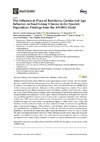Please use this identifier to cite or link to this item:
https://accedacris.ulpgc.es/jspui/handle/10553/41896
| Title: | The influence of place of residence, gender and age influence on food group choices in the Spanish population: findings from the ANIBES study | Authors: | de Lourdes Samaniego-Vaesken, Maria Partearroyo, Teresa Ruiz, Emma Aranceta Bartrina, Javier Gil, Angel Gonzalez-Gross, Marcela Ortega, Rosa M. Serra-Majem, Lluis Varela-Moreiras, Gregorio |
UNESCO Clasification: | 3206 Ciencias de la nutrición | Keywords: | Socioeconomic factors Place of residence Habitat size Food group consumption Intake, et al |
Issue Date: | 2018 | Publisher: | 2072-6643 | Journal: | Nutrients | Abstract: | Socioeconomic factors (SEF) can exert a great impact on food choices. However, limited data are available from the Spanish population. Our aim was to describe the influence of place of residence and habitat size on food group intakes. Data were obtained from the ANIBES study. A 3-day dietary record provided information on food and beverage consumption. Data analysis compared gender, age, Nielsen geographic areas, and habitat population size (urban, semi-urban, and rural). Place of residence did not appear to be a determinant for specific food group consumption during childhood and adolescence, as only higher intakes of non-alcoholic beverages were observed among children aged 9 to 12 years living in the East, when compared to those from the Northwest of Spain (p < 0.05). Food choices within adults (18 to 64 years) and seniors (65 to 75 years) were conditioned: sugar and sweets intake was significantly higher (p < 0.05) for adult men living in the Northwest than those from the South, and senior males from North Central areas had significantly higher consumption of eggs (p < 0.05) compared to the Northeast. Basic food group consumption was only affected during childhood and aging. Adults who inhabited rural areas consumed greater quantities of fats and oils than those from higher population densities (p < 0.01). Our results indicate that place of residence and habitat size have a limited influence on food choices, regardless of age and gender in the ANIBES study population. It is fundamental to acknowledge that other SEF variables are important and further studies are needed to monitor and assess these influences are warranted. | URI: | https://accedacris.ulpgc.es/handle/10553/41896 | ISSN: | 2072-6643 | DOI: | 10.3390/nu10040392 | Source: | Nutrients [ISSN 2072-6643], v. 10 (4), article number 392 |
| Appears in Collections: | Artículos |
SCOPUSTM
Citations
27
checked on Jun 8, 2025
WEB OF SCIENCETM
Citations
18
checked on Jun 8, 2025
Page view(s)
104
checked on Oct 12, 2024
Download(s)
104
checked on Oct 12, 2024
Google ScholarTM
Check
Altmetric
Share
Export metadata
Items in accedaCRIS are protected by copyright, with all rights reserved, unless otherwise indicated.
